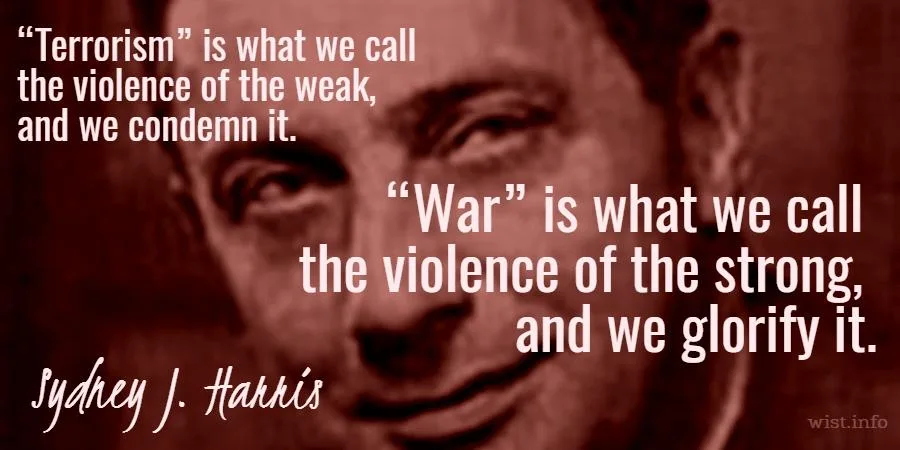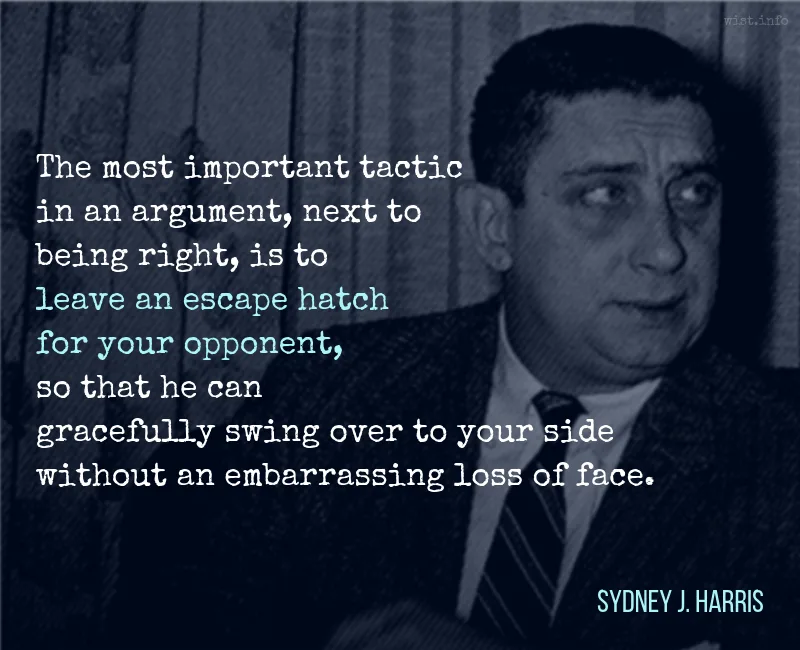Agnosticism is a perfectly respectable and tenable philosophical position; it is not dogmatic and makes no pronouncements about the ultimate truths of the universe. It remains open to evidence and persuasion; lacking faith, it nevertheless does not deride faith. Atheism, on the other hand, is as unyielding and dogmatic about religious belief as true believers are about heathens. It tries to use reason to demolish a structure that is not built upon reason.
Quotations by:
Harris, Sydney J.
As we grow older, we should learn that these are two quite different things. Character is something you forge for yourself; temperament is something you are born with and can only slightly modify. Some people have easy temperaments and weak characters; others have difficult temperaments and strong characters. We are all prone to confuse the two in assessing people we associate with. Those with easy temperaments and weak characters are more likable than admirable; those with difficult temperaments and strong characters are more admirable than likable.
The difference between patriotism and nationalism is that the patriot is proud of his country for what it does, and the nationalist is proud of his country no matter what it does; the first attitude creates a feeling of responsibility, but the second a feeling of blind arrogance that leads to war.
To me, at least, the greatest blasphemy in the world is not the denial of God’s existence, but the claim that we have a pipeline to Him, and that all other claimants are wrong. This assertion is what plunged the world into the bloodiest of wars in the past, and might well do so again if the zealots had their way.
Sydney J. Harris (1917-1986) Anglo-American columnist, journalist, author
“Strictly Personal” column (20 Jan 1985)
Reprinted in Clearing the Ground (1986)
A person who has no genuine sense of pity for the weak is missing a basic source of strength, for one of the prime moral forces that comprise greatness and strength of character is a feeling of mercy. The ruthless man, au fond, is always a weak and frightened man.
The most dangerous heresy of our time, it bears repeating, is the belief that belief in itself is a good thing, regardless of its content; for faith that is attached to an unworthy or inadequate object makes people less than they are, not more.
An idealist believes the short run doesn’t count. A cynic believes the long run doesn’t matter. A realist believes that what is done or left undone in the short run determines the long run.
Patriotism is proud of a country’s virtues and eager to correct its deficiencies; it also acknowledges the legitimate patriotism of other countries, with their own specific virtues. The pride of nationalism, however, trumpets its country’s virtues and denies its deficiencies, while it is contemptuous toward the virtues of other countries. It wants to be, and proclaims itself to be, “the greatest,” but greatness is not required of a country; only goodness is.
If you want to know what a man’s character is really like, don’t ask him to tell you his creed or his code (for everyone has a prettified public version of these), but ask him to tell you the living person he most admires – for hero worship is the truest index of a man’s private nature.
Maturity begins when we’re content to feel we’re right about something without feeling the necessity to prove someone else wrong.
Sydney J. Harris (1917-1986) Anglo-American columnist, journalist, author
(Attributed)
Frequently attributed to Harris, but the original source has not been found. Earliest citation I could find was in Reader's Digest (1973), where it is further credited to the Publishers-Hall Syndicate.
It’s surprising how many persons go through life without ever recognizing that their feelings toward other people are largely determined by their feelings toward themselves, and if you’re not comfortable within yourself, you can’t be comfortable with others.
The reason that truth is stranger than fiction is that fiction has to have a rational thread running through it in order to be believable, whereas reality may be totally irrational.
It is tiresome to keep hearing that the Bible is “the best-selling book” of all time, as though the fact that many people buy it indicates that they read it, understand it or follow it.
Sydney J. Harris (1917-1986) Anglo-American columnist, journalist, author
For the Time Being (1972)
(Source)
Men may be divided almost any way we please, but I have found the most useful distinction to be made between those who devote their lives to conjugating the verb “to be” and those who spend their lives conjugating the verb “to have.”
Sydney J. Harris (1917-1986) Anglo-American columnist, journalist, author
For the Time Being, ch. 6, epigram (1972)
(Source)
We have not passed that subtle line between childhood and adulthood until we move from the passive voice to the active voice — that is, until we have stopped saying, “It got lost,” and say, “I lost it.”
The most important tactic in an argument, next to being right, is to leave an escape hatch for your opponent, so that he can gracefully swing over to your side without an embarrassing loss of face.
Sydney J. Harris (1917-1986) Anglo-American columnist, journalist, author
Pieces of Eight (1982)
(Source)
Frequently misquoted: "The most important thing in an argument, next to being right, is to leave an escape hatch for your opponent, so that he can gracefully swing over to your side without too much apparent loss of face."
Youth finds no value in the views it disagrees with, but maturity includes discovering that even an opinion contrary to ours may contain a vein of truth we could profitably assimilate to our own views.
Sydney J. Harris (1917-1986) Anglo-American columnist, journalist, author
Pieces of Eight (1982)
(Source)
Many married couples separate because they quarrel incessantly; but just as many separate because they were never honest enough or courageous enough to quarrel when they should have.
One of the oldest Russian proverbs remains as inexorably true in modern America: “No one is hanged who has money in his pocket.” Or, one might say, capital punishment is only for those without capital.



